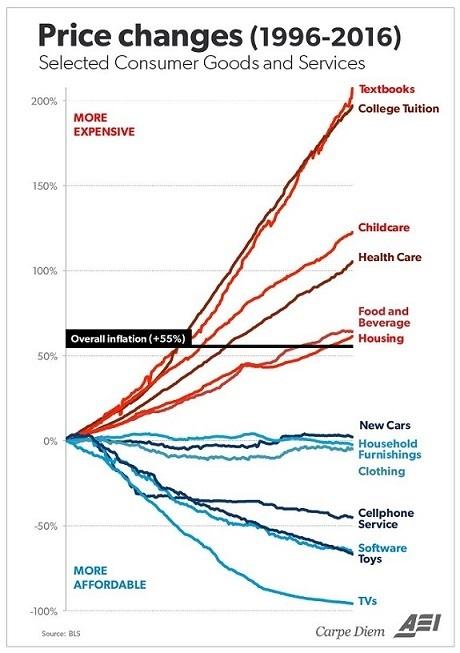https://seekingalpha.com/article/4111845-careful-wish-inflation-much-higher-advertised
This is a really great chart from the article (thanks for posting Nerdy). I was at a real estate conference in Paris last year and a guy from JPM talked about this very topic. We see a lot of deflation in mostly discretionary consumer goods. However, inflation is spiking in a lot of basic needs stuff (shelter, education, childcare, healthcare). This really helps explain a lot of the “class warfare” going on globally.
As an aside, I’m convinced that universities will face a day of reckoning from cheaper and more efficient education methods: online and certificate programs. So far these alternative education vehicles have failed to make big dents into higher eduction (though some prominent certificate programs have had some success…). However, the market is just so big now and unverities are pretty slow to change that it’s ripe for disruption IMO.

You’re assuming that expensive education is just for academic learning. It is, somewhat, but it’s real purpose is to separate the elite of society from the riff raff. In addition to an academic barrier, it’s in the interests of elite universities to have some kind of financial barrier as well - whether this is explicit (high tuition), or implicit (rich people get better grades). As long as inequality persists and high rewards keep accruing to certain high achieving individuals in society, college costs probably won’t decrease.
What would break the system is if people from cheap schools - community college, online learning, or other hacksaw places start to succeed in life and outshine all the Harvard or Stanford people. However, the world is going to have to change in a revolutionary way for that to happen.
This is starting to happen a bit already with people attending coding bootcamps rather than spending 4 years to get CS degrees etc. Obviously they won’t be as attractive a candidate as someone who went to a prestigious university but their ROI is much higher and with the growing demand for people with those skills the hiring managers really just need someone who knows “X” coding language and can do the job.
GoaB: I agree, edX also offers certificates. Not sure if they carry any weight in getting people jobs but I do know that some people in the tech field are requested to do things like that in order to develop themselves and get better so they can move up to becoming developers. I know one company that has this for a model, and a buddy there who started ~6 months ago as a QA person, and is expected to move to a dev role within 6-18 more months, as people have done from his position in the past. He does this stuff while working full time, so similar to the cfa (and probably more practical).
i actually thoguht ohai was cray about the explicit costs because there is so much help available that i went to school for free. but after thinking about it, i was accepted to both usc and ucla, but decided against usc because the tuition (explicit) was high and i felt like i didnt belong (implicit). granted ucla is a better school but usc has richer people which is more imp. esp. in finance. anyways, i think the solution to income inequality is taxation. so UBI it, and high taxes on the rich. problem solved.
You just like… can’t think of a system that doesnt involve money, maaaaaaan
Does the graph represent gross tuitions, or net tuitions?
Online coding classes and similar programs are valuable facilities that help many people in their careers. However, they ultimately only help a small segment of the population and to a limited degree. Google or Facebook is not going to replace MIT graduates with community college graduates with Code Academy degrees; within technical professions, there are many tiers of competence. Plus, the most successful graduates of these coding “boot camps” probably have college degrees or higher to begin with. The next President is 1000x more likely to have a college degree from an Ivy League university than a high school degree only, but some night classes. Do not confuse efforts to alleviate inequality with actual transformative change on a large scale. By most metrics, inequality and elitism are getting more pronounced.
of the lines CFABB posted the one that REALLLLLY stands out to me as an outliar is cell phone service you see it initially trending with TV’s to rick bottom then it essentially flattens out.
Looks like that happened around 2000 or 2001. Wonder if it’s just coincidence that that’s when Verizon Wireless and Cingular were born.
I think the cell phone effect is part of the S Curve, where technology transitioned rapidly from the bulky phones with limited coverage in the 1990s to the cheap and relatively modern Nokia 3xxx type models, along with wide expansion of signal coverage. I’m sure oligopolistic behavior still has a noticeable effect on the slope of that curve, but it is probably not directly responsible for the change described above.
^ certainly agree its likely due to multiple causes, cellular service has certainly required a significant amount of capital & upgrading towers is still an fairly large ongoing CapEx item to keep up with the edge/3g/4g/LTE upgrades. There seem to be the occasional price battles but nothing that has become a race to the bottom for consumers yet.